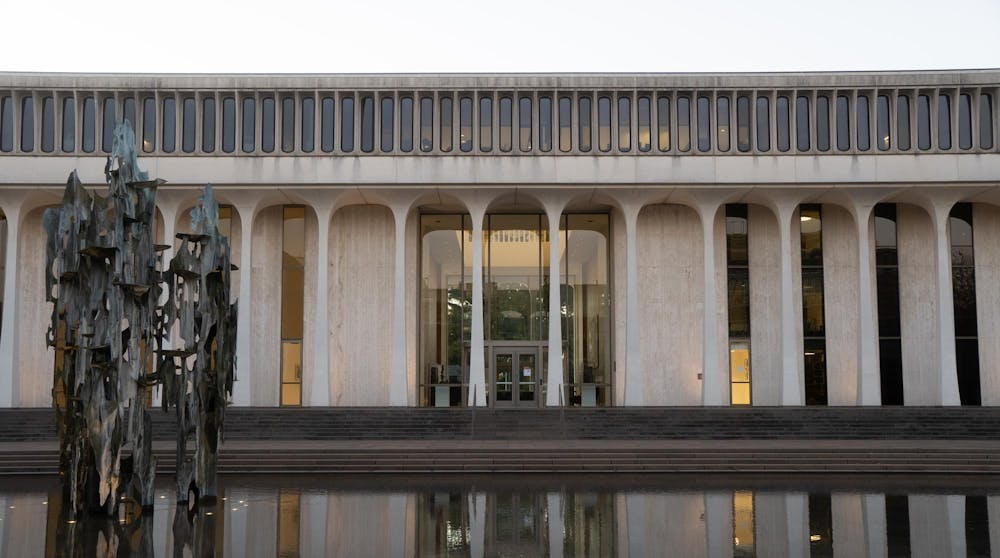The following is a guest contribution and reflects the author’s views alone. For information on how to submit a piece to the Opinion section, click here.
The typical student consensus at Princeton seems to be that USG is not defined by its policy advocacy, but as the “free sweatshirt” people, the “giver-of-merch,” the party planner, the inconsequential. This is understandable; the sheer scale and reach of Lawnparties, with its $260,000 budget, generates USG’s reputation of being built around programmatic facets. But USG is more than an organization that just plans social events. Its members care deeply about advocating for beneficial University policies, too. But in order for that to happen, more students need to better engage with USG’s decision-making process.
As an appointed member of this USG administration, I oversee the policy initiatives of USG working groups run by U-Councilors and Class Senators. These working groups, in addition to many USG committees, work on relevant policies to students’ struggles from international student experience to civil liberties to mental health. Through this managerial and bureaucratic position, I am, in the words of Lin Manuel-Miranda, in the room where it happens. I get to witness the intensity and discipline that underlie USG’s work, and the genuine dedication of its members to making a positive difference.
I also see the student body’s dismissal of it.
But USG is more than just Lawnparties. The introduction of early-morning TigerTransit to Princeton Junction around breaks, the transition from certificates to minors, and the reduction of therapy copays to $10 last year were all the results of USG policy lobbying. Years of dedicated advocacy and input to University administrators from USG drove the incorporation of the “Suspension (Not Served)” sanction to the Honor Committee and the lengthening of passing periods.
Unfortunately, policy work isn’t easy. Proposals can die in University committees, or lose steam between USG administration changes. While USG holds autonomy over its own budget and initiatives, when it comes to university-wide policy, USG and students alike have to put their faith in University administrators to be willing to meaningfully and transparently collaborate, hear out demands, and actively address students. Yet, University administrators sometimes don’t involve USG in their decision-making process and side-step USG, despite our direct requests to engage. Take the recent dining and housing policy change, for example.
Still, USG does have members on University committees such as the University Student Life Committee, where co-curricular policies are reviewed, and the Council of the Princeton University Community, where many binding administrative policy decisions are made. While University administration ultimately has many final says, this doesn’t mean that students shouldn’t care about or disregard USG’s efforts.
History provides an example of USG’s advocacy resulting in significant positive change. Since at least 1926, Princeton students had demanded a campus center. In 1988, the University administration formed a Campus Center Committee that moved slowly without concrete proposals. So in 1989, USG responded by launching its own awareness and fundraising campaign, CAMPUS CENTER NOW, and called upon “all members of the University community…to join us in making a Campus Center a reality.”

USG’s energetic policy advocacy led to intensive student government and student body advocacy for the campus center through the year 2000, when Frist Campus Center finally opened. This work would not have been possible without USG’s engagement of the student body, and the student body’s care in USG’s policy goals. Had students been apathetic to USG’s call to action, a campus center might never have come to be.
I write this editorial on USG in my personal capacity as a USG member, and represent only my own opinions. That said, I believe I concur with most Senate members when I encourage all undergraduate students to come to a USG Senate meeting. They are open to the public, including the entire student body, every Sunday in Robertson Bowl 016 at 5 p.m. USG members regularly meet with and question University administrators at these meetings and can connect you to those who can answer your questions, or will get you the answers themselves.
The core of USG’s policy work is undergraduate student concerns. And the best way we learn what the student body wants us to advocate for is if you engage with us. Almost two hundred students responded to USG’s dining and housing survey, resulting in the administration listening to student concerns and USG advocacy about the new housing and dining policy. You can also join a working group, which are all open to the entire undergraduate student body, to be more involved on USG policy priorities.
In a climate of political uncertainty, it is now more important than ever for students to be engaged with university policymaking — and USG is the most direct avenue to engage with administrative decision makers. While USG’s social events — including Lawnparties — are important, especially in times of stress and division, we also represent you. We don’t just plan parties.

On Tuesday, Oct. 28, I will moderate a USG Town Hall Luncheon discussing USG’s current policies and programming in Robertson Bowl 016 from 12:15-1:00 p.m., open to all undergraduate students. Please come. And, in keeping with the spirit of USG’s policy and programming, there will, of course, be free lunch.
Marvel Jem Roth ’28 is a prospective Economics major from Los Angeles and is the deputy project manager for USG. She may be reached at marvel[at]princeton.edu.
Please send any corrections to corrections[at]dailyprincetonian.com.








